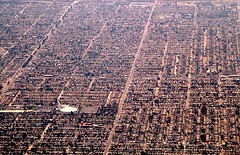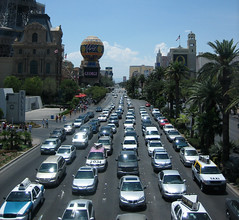An open letter to the next president on sustainable development (part 1) (reposted)

Posted September 8, 2008 at 2:01PM
Now that the two major political parties have, for better or worse, formally nominated their candidates for president and vice president of the United States, I am reposting these two entries, with some minor updating. They were originally published on August 12 and 13, when half my readers were on vacation anyway. ;) Please do feel free to enrich the discussion with comments.
Dear Mr. President-elect*:
As you may know, America is entering a period of rapid growth that will have a profound effect on our national well-being. As a result, you and your administration will have an unprecedented challenge, but also an unprecedented opportunity to help states, cities and towns shape our communities to maximize quality of life for all while conserving environmental and economic resources.
Unprecedented growth
 In particular, by 2030 we will have a population increase of 70 million new Americans, accompanied by employment growth of 40 million new jobs, both compared to 2005. We will also experience an amazing expansion of our built environment, to the tune of 50 million new and replacement homes and 78 billion square feet of offices, shops, schools, and other nonresidential space, along with potentially massive amounts of transportation and municipal infrastructure required to serve it.
In particular, by 2030 we will have a population increase of 70 million new Americans, accompanied by employment growth of 40 million new jobs, both compared to 2005. We will also experience an amazing expansion of our built environment, to the tune of 50 million new and replacement homes and 78 billion square feet of offices, shops, schools, and other nonresidential space, along with potentially massive amounts of transportation and municipal infrastructure required to serve it.
Our nation has never faced this amount of growth before in so short a time. How we respond (and, not to put pressure on you, but also how you respond) will determine whether our great nation can maintain an equitable and prosperous society, and whether we can secure a sustainable, healthy environmental future for our children and grandchildren.
The sustainability imperative
We must not allow growth to occur in the same way as in latter half of the 20th century. Suburban sprawl has forced citizens and businesses alike to drive ever-longer distances to get to work, to serve customers, to go to school, and to pursue shopping and recreation.  At the same time, because of chaotic, wasteful development patterns, meaningful alternatives to driving have become unavailable for most Americans. The results include astounding growth in greenhouse gas emissions from transportation, excessive energy use, air and water pollution, and needless consumption of natural ecosystems and farmland.
At the same time, because of chaotic, wasteful development patterns, meaningful alternatives to driving have become unavailable for most Americans. The results include astounding growth in greenhouse gas emissions from transportation, excessive energy use, air and water pollution, and needless consumption of natural ecosystems and farmland.
Tragically, the results also include a range of serious social problems, particularly for urban populations left behind as growth and investment fled to outer suburbs built on what was once forest or farmland.
Moreover, all this has also been hurting our economy. Traffic congestion due to automobile dependence and inefficient travel patterns wastes some $78 billion per year in lost productivity and wasted fuel. Rising per-unit infrastructure costs in spread-out subdivisions waste municipal resources. At home, transportation is now second only to housing in claiming over 20 percent of an average household’s budget, and over 40 percent of the average budget for those of lower income. These numbers are only going up with rising fuel prices.  We are already seeing the tip of the iceberg of serious economic consequences in the form of precipitous drops in home values and rampant home foreclosures in our suburbs, and stress on family budgets because of the rise in the costs of gasoline and energy.
We are already seeing the tip of the iceberg of serious economic consequences in the form of precipitous drops in home values and rampant home foreclosures in our suburbs, and stress on family budgets because of the rise in the costs of gasoline and energy.
Impacts on global competitiveness
This is hurting us not just at home, but also in the global marketplace, as US businesses are plagued with inefficiencies not felt so severely by our international competitors. At the end of the last century, Australian researchers Peter Newman and Jeffrey Kenworthy found that,  on average, residents of American cities consume four times as much gasoline per capita as residents of European cities, and nine times as much as residents of Asian cities. This is due in no small part to automobile use per capita in the US that is 2.41 times that of Europe even though economic productivity per capita was only 0.85 that of Europe. America spends 24 percent more of its gross economic product on trips to work than does Europe.
on average, residents of American cities consume four times as much gasoline per capita as residents of European cities, and nine times as much as residents of Asian cities. This is due in no small part to automobile use per capita in the US that is 2.41 times that of Europe even though economic productivity per capita was only 0.85 that of Europe. America spends 24 percent more of its gross economic product on trips to work than does Europe.
We can fix this
The good news, Mr. President-elect*, is that we can avoid an exacerbation of these consequences and even reverse damaging trends if we get ahead of these problems and shape our new growth efficiently and equitably. But the signs are clear that, if we do not, the strain on our national well-being and economy will be immense; we will remain dependent on large quantities of imported oil in perpetuity; and our government will only continue to disappoint the overwhelming majority of Americans (not to mention residents of nations elsewhere who look to the US for leadership) who hope that under your administration we can once again become environmental leaders.
I have taken the liberty of preparing a few ideas that I hope you and your staff can think about as you work your way through these challenges and opportunities. Please look for them in my next letter.
Offered with great respect for your office,
Kaid
______________________________
*(whoever you turn out to be)
An abridged version of these comments will appear in a forthcoming issue of Shelterforce magazine.
Reminder to readers: Comments on the substance are always fair game, but we cannot accept comments on the election or candidates. Thanks.